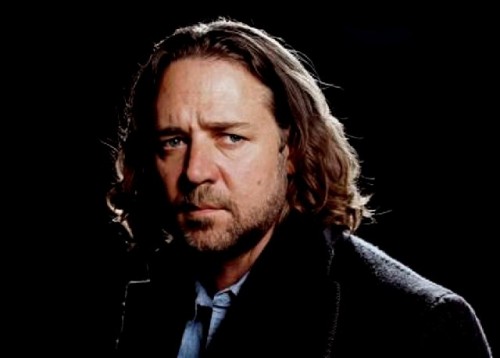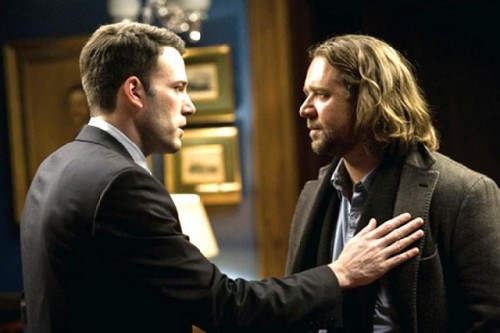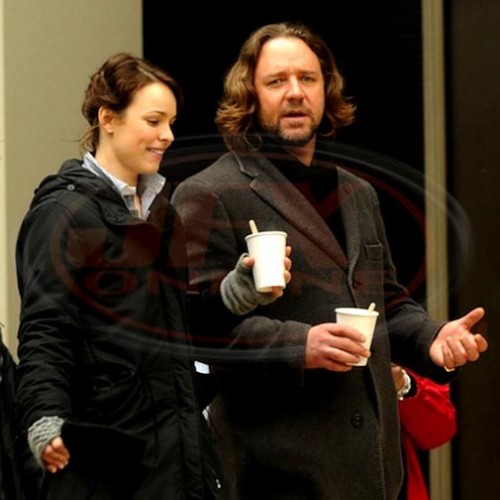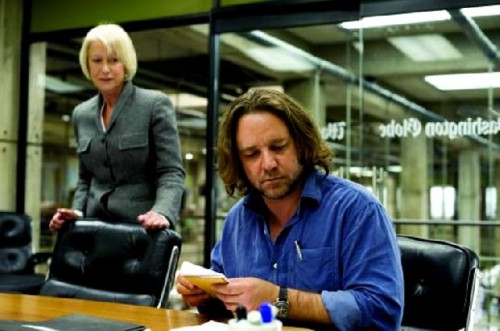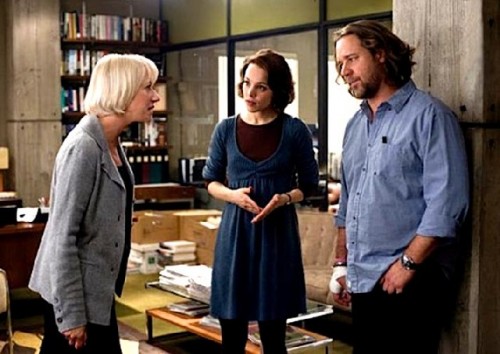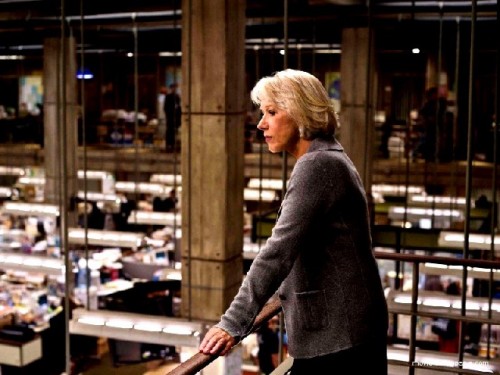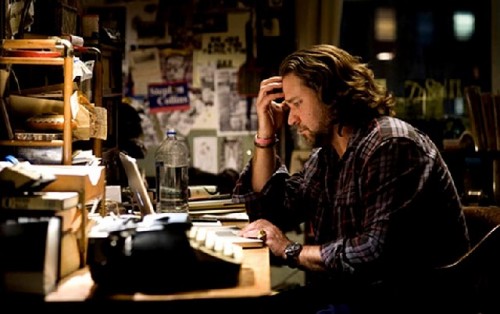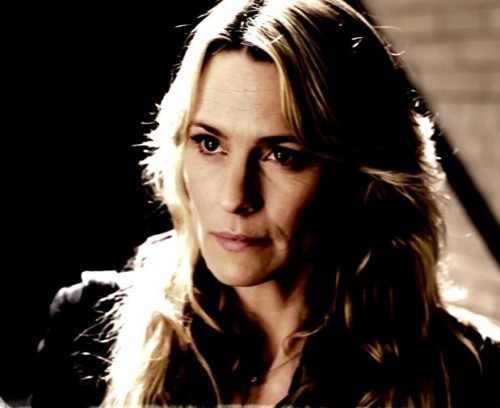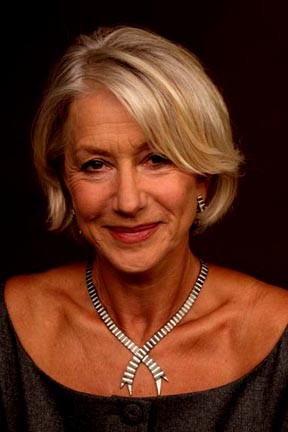State of Play Delivers
Political Thriller Stars Russell Crowe, Ben Affleck and Helen Mirren
By: Charles Giuliano - Apr 21, 2009
The BBC six hour mini series "State of Play" has been compressed, truly, to two, dense, plot filled hours in a politically themed thriller, ripped from the headlines, directed by Kevin Macdonald.
Sure the story lines whirls about fast enough to give you a dose of vertigo, but fasten your seat belt, and enjoy the ride. As we did at the North Adams Movieplex during a sparsely attended Monday night on the strong recommendation of our friends Steve and Jan. We had seen the trailers which seemed promising. For once they lived up to expectations with a super cast that included a now paunchy, disheveled Russell Crowe looking every bit the part of Cal McAffrey an investigative reporter for a Washington, D.C. daily, Helen Mirren as his tough as nails editor, Cameron Lynne, and Ben Affleck as a philandering Congressman, Stephen Collins, whose mistress/ assistant has fallen or been pushed under a train.
Immediate suspicion falls on the dark forces of the private army with enormous government contracts Point Corp. Congressman Stephen Collins is on a committee investigating financial abuses and atrocities attributed to the paramilitary group. Its alleged infractions are all too familiar in the climate of private contractors and security organizations abroad, as well as here at home, functioning under the mandate of Homeland Security.
In an exchange during the hearings the CEO of Point Corp states that all of its associates are ex military doing their patriotic duty. To which Collins responds that we (The U.S. military) train them and you make billions off them. That sounds about right. Collins adds that during Katrina such private armies were hired to point their guns at American citizens. It was a job for those security forces to protect stores being looted by victims of the hurricane. Most of these "criminals" were desperately looking for food and water. As well as the occasional TV.
To make things more interesting/ confusing it appears that the reporter, McAffrey, and Congressman Collins were college roommates. Get this, while Collins was having an affair with his assistant, it appears that McAffrey was shagging his wife. She is underplayed by Robin Wright Penn as a character that never really develops. There is a similar problem with the blogger Delia Frye, played by Rachel McAdams, a twenty something who evolves as the partner of the scruffy McAffrey.
As we zoom about trying to keep up with the twists and turns what keeps this film afloat, and viewers riveted in their seats, is another sensational performance by Crowe. He has nicely evolved from a swaggering, arrogant, self absorbed, bastard of a leading man to now a far more vulnerable, nuanced and polished actor. Significantly, he has evolved sufficiently to underplay his role. He allows the character and its demands to supersede the star's persona and ego.
Actually, I never bought into the charisma of Crowe as a romantic leading man with that swaggering self confidence. His looks were too generic; more a bloke with personality, than a gorgeous dude in the Hollywood tradition. Here that role has been given to Ben Affleck, an ersatz pretty boy, who, guess what, is finally learning to act. Kindah. Which is to say, in this film, he isn't really terrible. Although he displays a range of emotion that runs the gamut from A to B. But, he's easy on the eyes. Where, by contrast, Crowe is a bloated, pudgy, sloppy, train wreck with a freight wig for a mop of hair.
Which is to say, a reporter. Having been there and done that I was delighted to note the authenticity of the news room and that clutter around his desk. Or the shabby, run down nature of his digs which featured a bed, TV, computer and bottle of "Irish Wine" A.K.A whiskey. Which he offers to Mrs. Collins when she falls by for a quickie that never happens. She leaves in a huff realizing that she has devolved from lover to source.
The wonderful and amazing Helen Mirren is also squandered in this film. The writing presents her as an a timely cartoon. She is trying to hold onto what is left of the newspaper. The editor is caught between allowing reporters the time to develop complicated stories and the need to punch up a quick and easy scandal and gossip angle that sells papers. This rush to judgment is exacerbated by competition with bloggers who post with none of the restraints of accuracy and fact checking. The young Delia Frye is one of those bloggers for the on line function of the paper whom Lynne describes as "cheap, hard working, and posts hourly." As opposed to a "real" reporter like McAffrey who slogs along in pursuit of the facts.
The real story here, as Mirren's character bellows, is that newspapers can no longer afford the staff and time to do any real digging. There just isn't the ad revenue to support that. Today, for example, the New York Times parent company is reporting a first quarter net loss of $74.5 million and ad revenue declines of 20 to 30% among its subsidiaries. Which major city will be the first to wake up without a daily paper? The Times is threatening to shut down the Boston Globe unless there are major concessions from unions and the newspaper guild. Is this posturing or a real threat?
As we switch from traditional daily papers to blogs as the primary source of information the glaring loss is in investigative reporting. The romantic thriller "State of Play" may chronicle the last gasp of traditional journalism. With the loss of this kind of digging politicians, para mililitary organizations, and shadow governments will function with impunity. Literally, they will get away with murder.
Our government functions under the illusion of checks and balances between executive, legislative, and judicial branches. An unseen part of the equation, the other branch, is the Fourth Estate. Without this outside oversight who will keep an eye on government and its abuses?
Here it all comes out ok. McCaffrey gets his story sharing a byline with the rookie reporter, Frye. The bad Congressman goes to jail and justice prevails. But, the scary part is that this is just a movie.

